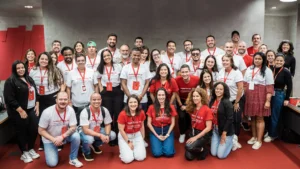Emerging in the midst of the 2008 global financial crisis, the sharing economy has brought new perspectives of income, consumption and sustainability to society in the last decade.
This term refers to a new economic system, in which people can use technology — and, of course, the internet — to share goods and services. This means sharing the creation, production, distribution and even consumption of goods and services between people, platforms and organizations.
Therefore, the sharing economy can be defined as access to other people's properties through the use of online services, carrying out monetary or non-monetary transactions.
How did the sharing economy emerge?
The sharing economy emerged in the 21st century, with the advancement of technology, changes in work relationships and society's debt.
The instability of the market and employment, environmental concerns due to high consumption and the population's indebtedness to 2008 financial crisis required flexible, collaborative, accessible and low-cost solutions.
The internet and the smartphone were the two main technological advances that drove the emergence and consolidation of the sharing economy.
In this sense, this link of occasional, divided and low-investment consumption has become a viable, practical and profitable alternative for people, companies and platforms.
What is the importance of the sharing economy?
The relevance of this model is due to the fact that it is an alternative to hyperconsumerism, which has become unsustainable, both economically and environmentally.
Furthermore, the sharing economy brings social benefits, both by collaborating with small communities and generating gains on a global scale.
This dynamic has promoted positive changes in several sectors of the economy, in the way of consuming, sharing and generating income, in business.
These changes meet the many people's wishes: less competition, more free time, healthier lifestyle, conscious consumption, environmental preservation and respect for the collective at the expense of the individual.
How does the sharing economy work?
The sharing economy works through the sharing of goods and services carried out on the internet, on websites, applications and/or digital platforms.
In these environments, people can make direct transactions with each other, such as quick services or renting and lending items, without the need for third-party intermediation.
Some examples of services in this model are car sharing, temporary rental of properties, delivery or care services, such as pet sitter.
Benefits of the sharing economy
The sharing economy brings numerous social, economic and environmental benefits both for those who offer goods and services and for those who use them.
Lower than average prices for equivalent services and goods and extra income for suppliers are economic and social benefits generated by the sharing economy.
In relation to environmental benefits, many sharing economy businesses are sustainable, with positive impacts, by reducing the use of resources and pollutants.
An example of this are car sharing apps, such as bicycle and cars, and accommodation.
In Shanghai, China, the bike sharing reduced emissions of greenhouse gases from 25 thousand tons to 64 tons in 2016.
How can the sharing economy impact society?
Its impact can be positive when there are advances in sustainability issues, consumption patterns, income generation and social relations.
By sharing a consumer good, a company, person or institution is helping to reduce the production of that good, which will have a positive impact on the environment.
Furthermore, by sharing a good, the number of consumers of that good increases — people who might not have access to it if it weren't for sharing.
The production of a good, whether durable or non-durable, requires the use of raw materials, natural resources, such as water, and generates waste that is not always recycled.
In this sense, sharing changes the way we consume, placing more emphasis on ethical and conscious consumption and experience than on consumerism.
Use of technology in sharing
Technology is the means by which sharing economy experiences take place, and its use aims to bring people and companies together for different purposes.
Another relevant point of technology in the sharing economy is the possibility of evaluating a service and making this evaluation available to everyone interested in it.
The evaluation helps to value good consumers and suppliers, increases the security of the commercial relationship and makes it possible to improve the quality of products and services.
On iFood, customer review It is very important, as it is what will help the company understand what needs to change and what is pleasing.
Sharing Economy Examples
Several sharing economy companies have emerged in the last decade abroad and in Brazil, and many of them have gained international reach, moving billion every year.
One of them is iFood, a technology company focused on the delivery of meals and purchases and which promotes the relationship between establishments and consumers in a practical and accessible way, alongside delivery men and women.
A Uber, founded in 2010 in the United States, is an individual transportation company that promotes vehicle sharing, mobility and delivery services.
In the hosting area, examples are digital platforms Airbnb and Couchsurfing. Airbnb is a vacation rental service.
O Couchsurfing It works as a social network for people to provide space in their homes, free of charge, to travelers, tourists and others.


